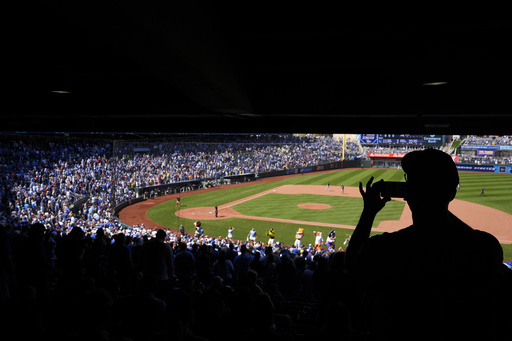Major League Baseball (MLB) has announced plans to manage and distribute local broadcasts for the Cleveland Guardians, Milwaukee Brewers, and Minnesota Twins starting next year. This move follows the expiration of the teams’ previous contracts with Diamond Sports Group at the end of the regular season.
Additionally, the Texas Rangers, whose partnership with Diamond also came to an end last month, stated that they would not continue with Diamond Sports and are currently exploring alternative options for the upcoming season. The inclusion of the Guardians, Brewers, and Twins brings the total number of teams for which MLB will oversee broadcasting to at least six as they head into 2025.
This past season, MLB assumed broadcast responsibilities for the San Diego Padres and Arizona Diamondbacks, and it will take over for the Colorado Rockies this year as well. Rick Schlesinger, the president of business operations for the Brewers, expressed hope that more teams will join MLB’s broadcasting model as opening day approaches next season.
“This has been a long process. It’s very deliberative,” Schlesinger noted. “We’ve done this through a lot of work, a lot of analysis. I think this will be a significant game-changer for us and our content.”
By taking control of these broadcasts, MLB anticipates an increase in market penetration, projecting an additional 2 million households per team. For instance, the Diamondbacks improved their reach from 930,000 households on a regional sports network to 5.6 million homes across various platforms, including cable and streaming.
Noah Garden, MLB’s deputy commissioner for business and media, emphasized the league’s commitment to expanding fan access to games while minimizing blackouts. “With the media landscape evolving, Major League Baseball is dedicated to ensuring our fans can see their favorite clubs and ultimately grow the reach of our games,” he said.
The Minnesota Twins are facing public backlash after announcing they would cut their player payroll for 2024, despite coming off a division championship and their first postseason victory in over two decades. While they stand to lose the rights fee from the Diamond contract, team president Dave St. Peter stated that the recent announcement would not adversely affect player spending for next season.
“We’ve spent considerable time with Major League Baseball to understand this marketplace better,” St. Peter said. “We closely analyzed what’s occurred in San Diego, Arizona, and Colorado. We’re comfortable with the economic model.”
He acknowledged the expectation of reduced local revenue for the Twins in 2025 but expressed confidence about long-term improvements in viewership and financial returns. “While we may see a dip in 2025, we believe that over time, the viewership and related economics will grow,” he assured.
Cleveland’s games previously reached about 1.45 million households on its regional sports network, but that figure is expected to soar by 235% to 4.86 million households. Similarly, the Twins’ reach is projected to increase by 307% from 1.08 million homes to 4.4 million.
Schlesinger mentioned that the Brewers had a reach of 800,000 households last season, predicting substantial growth under the new arrangement. “From a fan perspective, it’s fantastic because there will be total access and no blackouts,” he said. He acknowledged the logistical challenges involved in this transition, mentioning staff requirements and infrastructure decisions. “The timing is right, and we want to ensure that everything is in place for the 2025 season,” he concluded.
MLB might add more teams to its broadcasting portfolio as Diamond Sports Group continues its bankruptcy process. The once-dominant owner of regional sports networks could be left handling only Atlanta Braves games by 2025. Recently, Diamond presented its reorganization plan in U.S. Bankruptcy Court, aiming to void contracts with the Detroit Tigers and Tampa Bay Rays while negotiating new terms with the partial owners of their regional sports networks.
St. Peter expressed optimism about additional franchises adopting the new model. “It’s time to build a direct-to-consumer foundation, which is clearly the future for distributing our games,” he said. “Our ownership is aware of the potential consequences, but we believe the long-term benefits will outweigh any short-term challenges.”
A final hearing on Diamond’s reorganization plan is scheduled for November 14. Along with MLB rights, Diamond also represents 13 NBA teams and eight NHL teams.
Diamond Sports Group, in partnership with Sinclair Broadcast Group, purchased the regional sports networks from The Walt Disney Company for nearly $10 billion in 2019. This transaction was mandated by the Department of Justice as part of Disney’s acquisition of 21st Century Fox’s film and television assets.


